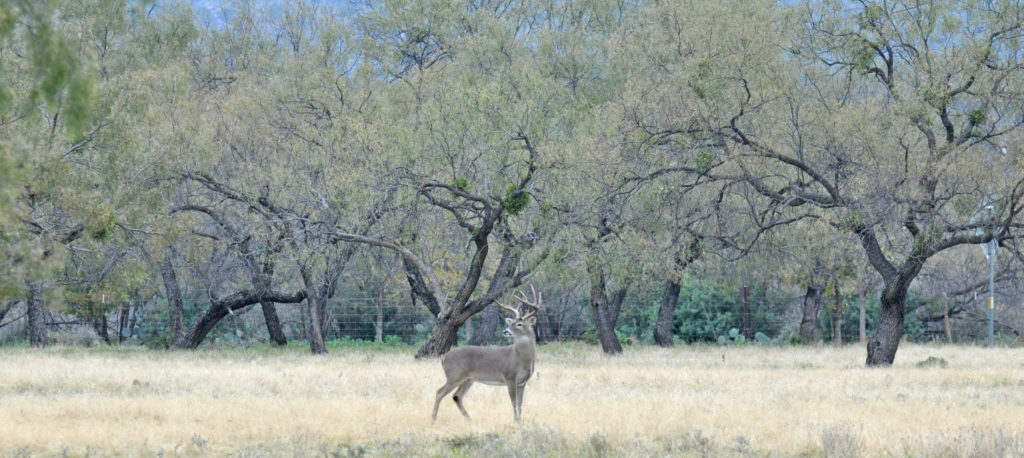
A recent decision from the Austin Court of Appeals in Bailey v. Smith, is important for many Texas landowners involved in the business of raising deer. This case addressed the issue of whether breeder deer–raised by persons with the required TPWD permit–are considered private property of the deer breeder or are owned by the State.

Photo via Robert Subblefield, Texas Tech University
One note here–this case also addressed a number of other technical legal issues such as sovereign immunity, ultra vires action of state officials, and attorney’s fees awards. This blog post will not discuss these issues, but will focus solely on the property rights of breeder deer. To read the entire opinion, click here.
Background
Ken Bailey and Bradley Peterson (“the breeders”) breed whitetail deer. They have the required deer breeder’s permit issued by Texas Parks and Wildlife (TPWD) allowing them to “possess live breeder deer in captivity” and to “engage in the business of breeding breeder deer.”
Bailey and Peterson sued the TPWD and various officials seeking to establish that breeder deer are private property and should not be subject to TPWD requirements for chronic wasting disease testing and limitations on transfer. In particular, they claim a property interest in the breeder deer and claim the Texas Parks and Wildlife Code violate their procedural due process rights.
The trial court found in favor of the TPWD and the officials. Peterson appealed.
Applicable Law
The Texas Legislature has passed regulations requiring “Deer Breeder’s Permits” for persons seeking to possess live breeder deer in captivity. See Tex. Parks & Wildlife Code Section 43.351-43.369. “Breeder deer” are defined as white-tailed or mule deer legally held by a permit. See id. at Section 43.351. “Captivity” is defined as meaning “the keeping of a breeder deer in an enclosure suitable for and capable of retaining the breeder deer it is designed to retain at all times under reasonable and ordinary circumstances and to prevent entry by another deer.” Id.
A person holding a valid deer breeder’s permit may “engage in the business of breeding deer in the immediate locality for which the permit was issued” and may “sell, transfer to another person, or hold in captivity live breeder deer for the purpose of propagation or sale.” Id. at Section 43.357. The permit serves as a complete defense for a deer breeder if accused of unlawful possession or transportation of whitetail or mule deer. Id. at Section 43.353.
These rights are subject to the TPWD’s ability to adopt rules concerning the possession of breeder deer and the procedures and requirements for purchase, transfer, sale, or shipment of breeder deer. See id. The statute further provides that only healthy breeder deer may be transferred, and requires that a transfer permit be obtained if breeder deer are to be moved to or from a facility. See id. Section 43.362. In light of the presence of chronic wasting disease found in captive deer in Texas, TPWD enacted strict rules related to testing and limitations on transport or transfer of captive deer.
Court of Appeals Opinion
The Austin Court of Appeals affirmed the trial court decision. [Read full opinion here.]
The Texas Constitution provides that no person “shall be deprived of life, liberty, property, privileges or immunities” except by the due course of the law of the land. This is analyzed with a two-part test: (1) Did the petitioner possess a liberty or property interest entitled to procedural due process protection; and, if so (2) what process is due?
To have a constitutionally protected property interest, a person must have a “legitimate claim of entitlement” rather than a mere “unilateral expectation.” Historically, with regard to animals, whether property rights existed depended on whether the animal was domestic or ferae naturae (wild) with wild game belonging to the people and held in trust by the State. This was codified by the Legislature in Texas Parks & Wildlife Code Section 1.011, which provides that “all wild animals, fur-bearing animals, wild birds, and wild foul inside the borders of this state are the property of the people of this state.” The Code also provides that restriction of the animals by fences does not affect their status as property of the state. Id. at Section 1.013.
Under this doctrine, a person has no property rights in the wild animal until it is “legally removed from the wild.” See State v. Bartee, 894 S.W.2d 34 (Tex. Ct. App. – San Antonio 1994). Texas law provides that whitetail deer and mule deer are considered game animals, and that no person may capture a game animal from the wild without a permit from the department. Peterson argues that his breeder’s permit allows ownership rights to arise in the breeder deer, but the Court rejected this is argument. The court held that the permit does grant the right to sell, transfer, or hold deer in captivity, but does nothing to make the breeder deer property of the breeder. Further, the fact that deer are held under a permit, which is valid only for a set amount of time, further evidences that nothing in the statute contemplates the breeder retaining any rights over the breeder deer if the permit is expired or revoked. Thus, the court held “we conclude breeder deer are public property held under a permit issued by the Department and, consequently, deer breeders do not acquire common law property rights in them.”












